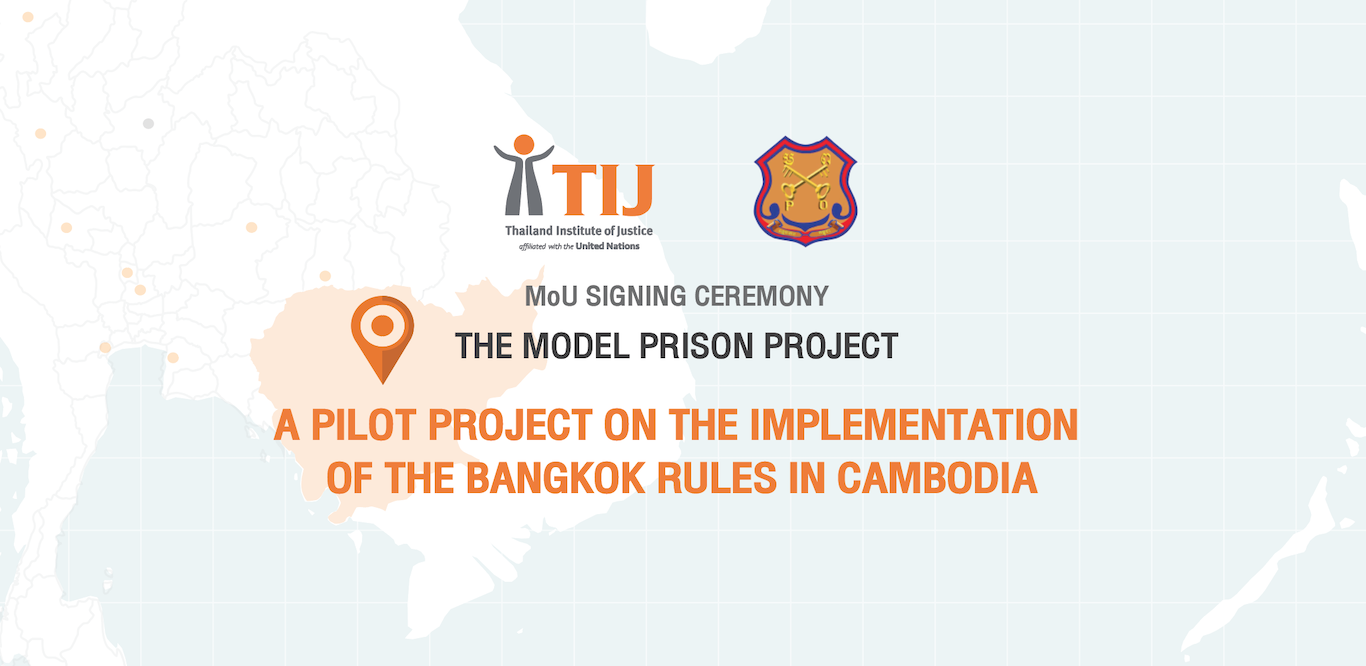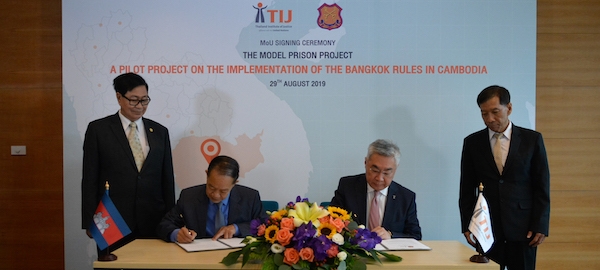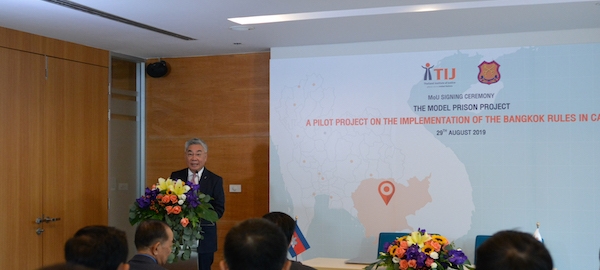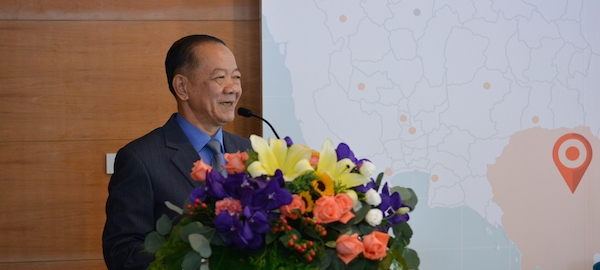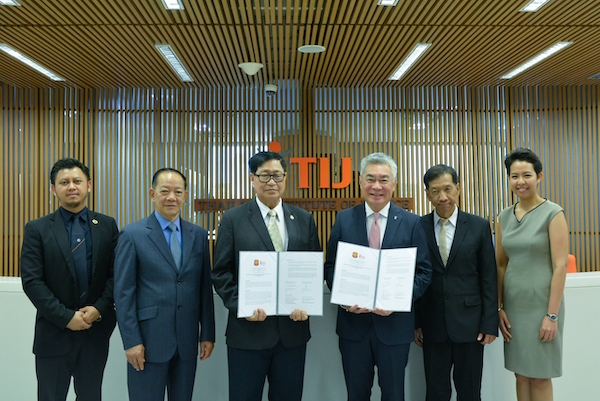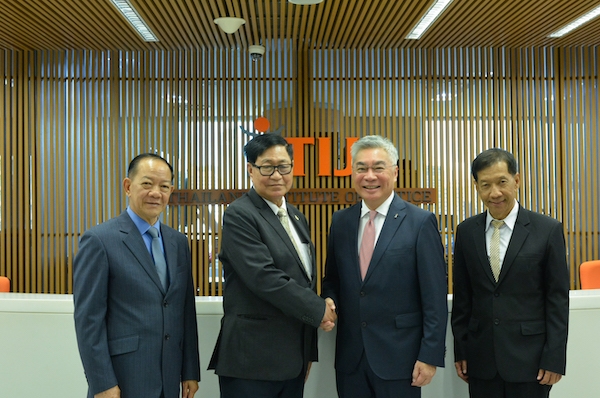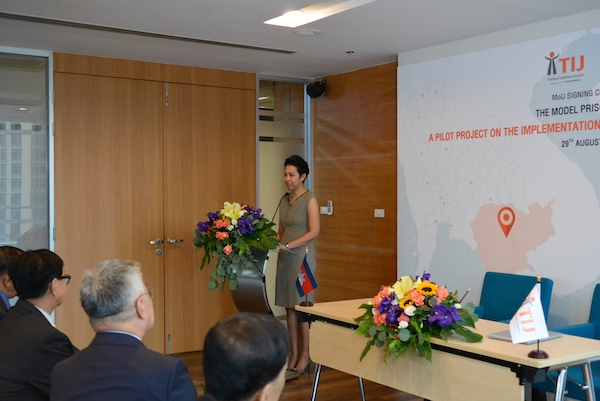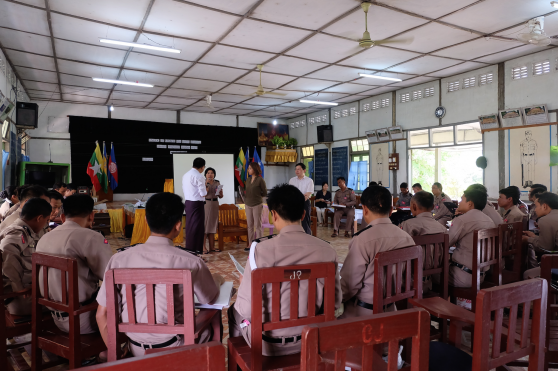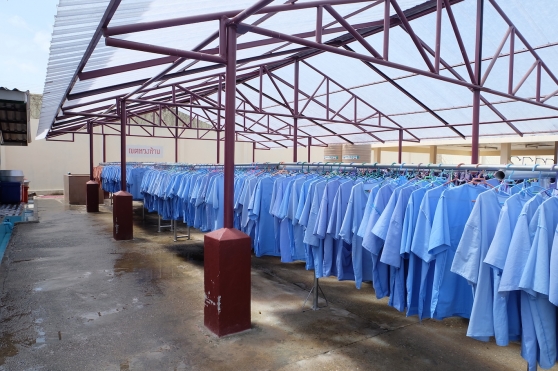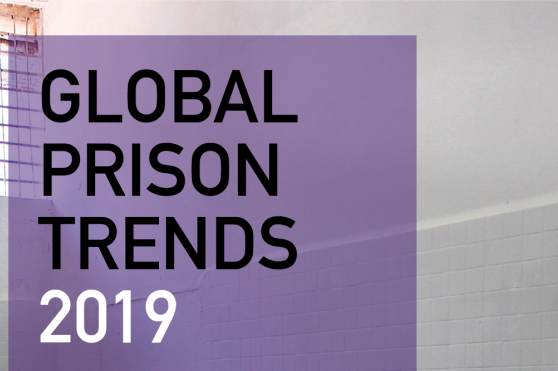The TIJ carried out a model prison project in ASEAN, first piloted in Cambodia
The Thailand Institute of Justice (TIJ) in cooperation with the Directorate General of Prisons (DGP) of Cambodia, scaled up “the Model Prison Project” for Cambodian’s largest women’s prison, the first of its kind in ASEAN. The project aims to improve the overall conditions of women prisoners in accordance with the Bangkok Rules in order to enable the prisoners to reintegrate into society peacefully and sustainably.
Presently, the population of women prisoners around the world is on the rise. According to the latest report of Penal Reform International (PRI) on global prison trends, the number of women and juvenile offenders increased 53% between 2000 and 2017. Therefore, it is crucial for the agencies involved in prison management to adopt standardized gender-sensitive prison management guidelines, such as the United Nations Rules for the Treatment of Women Prisoners and Non-custodial Measures for Women (the Bangkok Rules), in order to address the treatment of women prisoners as well as to establish and maintain decent prison standards in particular.
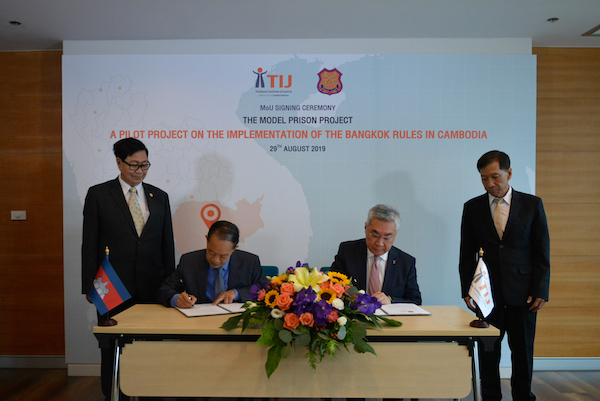
Recently, the TIJ, led by Prof. Dr. Kittipong Kittayarak, the Executive Director, signed a memorandum of understanding regarding cooperation with the Directorate General of Prisons (DGP) of Cambodia, led by Dr. Heng Hak, Undersecretary of State, and Dr. Chan Kimseng, Director General of Prisons, for “the Model Prison Project: A Pilot Project on the Implementation of the Bangkok Rules in Cambodia 2019-2020,” with the aim of elevating the standards of prison management in regards to gender-sensitive issues, ascertaining that international standards are being implemented in Cambodia.
Dr. Kittipong Kittayarak stated the following in this regard:
“This pilot project aims to establish cross-border partnerships and encourage collaboration between the two countries for the sake of vulnerable groups of people in society, women prisoners for instance. They are the minority within the criminal justice system and are often overlooked. This project conforms to the theme of the 2019 ASEAN chairmanship, “Advancing Partnership for Sustainability.”
The TIJ, together with the Department of Corrections of Thailand, has been promoting the implementation of the Bangkok Rules in the Thai context since 2015 by initiating “the Model Prison Project,” providing training courses for prison evaluators to enhance their understanding of the principles of model prison assessment and to set standards in using the Bangkok Rules assessment form. The courses have received a good response from correctional agencies, both from Thailand and the ASEAN region. Cambodian correctional officers have been continuing their participation in the training, engaging in information exchange and on-site visits to the selected model prisons and the prisons where the Bangkok Rules have been implemented, such as Uthaithani Provincial Prison, Nakhon Sawan Central Prison, Khlong Pho Temporary Prison, and Thonburi Women’s Correctional Institution.
In April 2019, the DGP of Cambodia invited Dr. Nathee Chitsawang, Special Advisor to the TIJ and former Director-General of the Department of Corrections of Thailand, and Ms. Chontit Cheunurah, Head of the Implementation of the Bangkok Rules and Treatment of Offenders Program of the TIJ, to attend a project plan meeting at the DGP in Cambodia and to visit the Correctional Centre 2 (CC2), the largest women’s prison in Phnom Penh, Cambodia, in order to understand the specific needs of female inmates as well as Cambodian correctional officials.
“The Model Prison Project: A Pilot Project on the Implementation of the Bangkok Rules in Cambodia 2019-2020” has a duration of two years with the following objectives: to train the correctional officers and CC2 staff in managing CC2 on the principles of gender-sensitive prison management, to jointly appoint a working group on the implementation of the Bangkok Rules project in CC2, to enhance the use of the existing infrastructure at CC2 to be consistent with the Bangkok Rules, and to collaborate in developing rehabilitation and reintegration programmes for women prisoners.
The TIJ hopes that the concept and framework of the Model Prison Project will be useful in adapting to the context of Cambodia and will help improve the quality of women prisoners’ life within CC2 as a pilot prison. The project will also be a starting point for the implementation of the Bangkok Rules in other women’s prisons in Cambodia and other countries in the ASEAN region.
Additional Information: The Model Prison Project under the Bangkok Rules
- The Model Prison Project in accordance with the Bangkok Rules began in 2015. The Implementation Assessment was developed from the tools of Penal Reform International (PRI) and adapted to the context of Thailand. The assessment comprises 10 sections that assess the level of compliance with the Bangkok Rules, from the policy level to prisoner treatment procedures. The purpose of this assessment is to act as an instrument in evaluating operations and procedures in prisoners, correctional institutes, or other detention centers regarding the treatment of female inmates.
- The implementation of the Model Prison Project in accordance with the Bangkok Rules in Thailand is a voluntary program, open to the participation of all prisons and correctional institutes. The operation will be carried out by region and will take one year for each region. The TIJ’s key steps for assessing the Model Prison Project are as follows:
- Preliminary Visit: to provide suggestions to the participating prisons regarding documentation processes and evidence preparation, and advise them on how to have a better understanding of how to improve their prison under its limitations. The prisons will have approximately 3-4 months to proceed with their physical improvement and to gather documents, as well as evidence, in order to present them to the evaluation committee in the next step.
- Assessment by Committee: the committee consists of experts from external agencies, experts from the TIJ, and representatives of the Department of Corrections. They are responsible for evaluating the implementations of the 10 sections of the Bangkok Rules, covering the treatment of women prisoners—from admission and pre-release preparation to the discharge process.
- There are twelve selected model prisons across Thailand: Uthaithani Provincial Prison, Chiang Mai Women’s Correctional Institution, Phra Nakhon Si Ayutthaya Provincial Prison, Women’s Penitentiary, Chonburi Women’s Correctional Institution, Samutsongkram Central Prison, Chiang Rai Central Prison, Fang District Prison, Phitsanulok Women's Correctional Institution, Tak Central Prison, Rattanaburi District Prison, and Nakorn Ratchasima Provincial Prison.
For more information : https://www.tijbangkokrules.org/en
Additional Information: Justice System in Cambodia
- There are approximately 2,433 women prisoners nationwide in Cambodia, which equals 8.6 percent of the total prison population.
- Fifty-four percent of all prisoners (both male and female) in Cambodia were convicted of a drug-related offense.
- Correctional Centre 2 (CC2) is the largest women’s prison in Cambodia.
- Two-thirds of the prisoners are awaiting trial.
- Cambodia passed the Juvenile Justice Law in 2017 with a focus on diversion, not detention.



